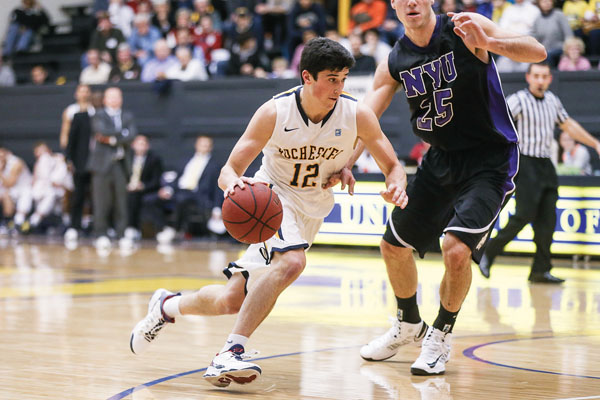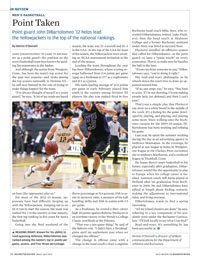In Review
 READING RIGHT: Known for his ability to read opposing defenses, DiBartolomeo was ranked among the nation’s top in points per game, assists, and free throw percentage. (Photo: Keith Walters for Rochester Review)
READING RIGHT: Known for his ability to read opposing defenses, DiBartolomeo was ranked among the nation’s top in points per game, assists, and free throw percentage. (Photo: Keith Walters for Rochester Review)John DiBartolomeo ’12 came to Rochester as a point guard—the position on the men’s basketball team best known for guiding his teammates to the basket.
And although the senior from Westport, Conn., has been the team’s top scorer for the past two seasons—and ranks among the top scorers nationally in Division III—he still sees himself in the role of trying to make things happen for the team.
“I’ve always thought of myself as a point guard,” he says. “A lot of my reads are based on how (the opponents) play us.”
For most of the 2012–13 season, opponents have had difficulty keeping up with the Yellowjackets. Jumping out to an 18–0 run to start the season, the team was ranked No. 1 in the country in late January, the first top ranking in five years for men’s basketball.
Going into the final weekend of the season, the team was 21–3 overall and 10–3 in the UAA. At the top of the UAA for most of the season, the Yellowjackets were awaiting an NCAA tournament invitation at the end of the season.
Leading the team throughout the year has been DiBartolomeo, whose scoring average ballooned from 11.4 points per game (ppg) as a freshman to 17.7 as a sophomore and 19.1 as a junior.
His team-leading average of 22.8 points per game in early February placed him ninth in the country among Division III players. He also was ranked third in free throw percentage at 91.6 percent; 17th in assist to turnover ratio, a measure of his ball handling skills; and 20th in assists with 5.5 per game.
As a freshman, he scored a then career high 30 points against Roberts Wesleyan in an overtime victory in the Wendy’s College Classic semifinals at the Palestra.
“That was a one-game thing,” he said of the Roberts win. “I didn’t have a ‘breakout’ game until my sophomore year when we changed the offense.”
The change in offense came with a change in the head coach’s chair. Longtime Rochester head coach Mike Neer, who recruited DiBartolomeo, retired. Luke Flockerzi, then the head coach at Skidmore College and a former Rochester assistant under Neer, was hired to succeed Neer.
Flockerzi installed an offensive system that called for DiBartolomeo—as the point guard—to have a “paint touch” on every possession. That is, to make sure he handles the ball in the lane.
“If you can draw someone to you,” DiBartolomeo says, “you’re doing it right.”
His read-and-react philosophy as he wheels down the court tries to draw an opponent toward him.
“If no one stops you,” he says, “You have to score. If I’m not shooting, I’m not making people help [on defense] and then I can’t pass.”
That’s not a simple play that Flockerzi can draw on a white board in the middle of the week.
It’s a feeling for the game developed by playing, and playing, and playing some more. Since walking onto the Rochester campus for the 2009–10 season, DiBartolomeo has been working and refining his game.
Last year, he spent the summer working during the day at an advertising agency in midtown Manhattan. In the evenings, he played at one league at home in Westport, one league at the Chelsea Piers recreation site in midtown Manhattan, and a weekend league in Trumbull, Conn.
He hopes there’s more basketball in his future, especially after graduation. DiBartolomeo would like the opportunity to play in Europe when his college career is finished.
Assistant coach Jeff Juron played in Holland after his graduation from Rochester in 2008. He and DiBartolomeo have talked at length about finding contacts, making the adjustment to international rules, and living overseas.
DiBartolomeo wants to find a spring internship. “All my [class] clusters are done,” he says, referring to a key component of his academic work under the Rochester Curriculum. “I’ll look locally to see what I can find.”
Read-and-react. It’s something he has been successful at.
Dennis O’Donnell is director of athletic communications for the Department of Athletics and Recreation.

